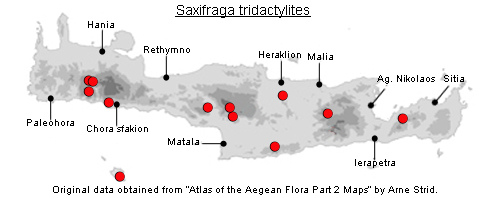
SPECIES DESCRIPTION
SAXIFRAGA TRIDACTYLITES
Family and Genus:- See- SAXIFRAGACEAE/Sect. SAXIFRAGA/Subsect
Common Names:- None
Homotypic Synonyms:- None
Meaning:- Saxifraga (L) Stone-breaker.
Tridactylites (Gr) Three-fingered.
General description:- Erect, slender annual, varying greatly in stature, often the
whole plant reddish with age, especially in dry, sunny positions.
Stem:-
1) Usually 4-12 cm tall, simple or sparingly branched, erect, slender, sparsely
glandular-pubescent,
Leaves:-
1) Basal, few, distant or in a lax rosette, ± withered at anthesis. petiolate.
a) outermost, with entire, elliptic lamina, the
b) inner, 3-1obed.
2) Lower cauline, flabellate ± deeply 3(-5)lobed into oblong, subobtuse, divergent
lobes.
a) middle, larger than the lateral ones;
b) upper, more reduced and sometimes entire.
Flowers:-
1) Generally 3-6 in a diffuse, bracteate cyme.
2) Pedicels, (2-)2.5-4(-5) times as long as the calyx.
3) Hypanthium, c. 2.5 x 2.5 mm at anthesis, enlarging somewhat in fruit, rounded
or truncate at the base.
4) Sepals, c. 1.5 x 1 mm, ovate, obtuse.
5) Petals, 2.5-3 x 1.5- 2 mm, suberect or spreading, entire or slightly notched,
white.
6) Ovary, at least 3\4 inferior;
7) Styles, very short, divergent.
Fruit:-
1) Capsule, subglobose.
2) Seeds, c. 0.4 x 0.25 mm, coarsely papillose.
Key features:-
1) Basal leaves, few, distant or in a lax rosette, ± withered at anthesis,
2) Lower cauline leaves, flabellate, ± deeply 3(-5) lobed.
3) Pedicels, (2-)2.5-4(-5) times as long as calyx.
Habitat:- Various open habitats with shallow, gravelly, soil, including rock ledges,
pavements, walls, roadsides and railway tracks, on different (substrates but often
on limestone, 0-1200 m.
Distribution:- Throughout mainland Greece and on several of the larger islands.
Almost throughout Europe also in NW Africa and Cyrenaica, extending through
Anatolia to NE Iran and Turkmenistan. A few scattered localities throughout Crete,
Rare.
Flowering time:- Mar-June, depending on altitude.
Photo by:- Dr. Armin Jagel
